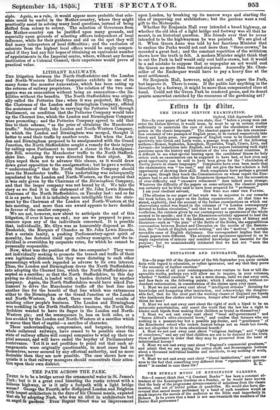LITIGANT RAILWAYS.
DIE litigation between the North Staffordshire and the London and North-Western Railway Companies exhibits in one of its many forms the monster Annexation, which has been eating up the returns of railway proprietors. The relation of the two com- panies was an annexation without being an annexation—the lia- bilities without the benefits. The North Staffordshire was origin- ally called the Potteries line ; when it was projected, Mr. Glyn, the Chairman of the London and Birmingham Company, offered the assistance of that body in carrying the Potteries bill through Parliament, on condition that the Potteries Company would take up the Churnet line, which the London and Birmingham Company were promoting ; and the Potteries Company agreed to add that line to their scheme, " as the price of obtaining the Manchester traffic." Subsequently, the London and North-Western Company, in which the London and Birmingham was merged, thought it better to send their traffic by another route. But when the Lon- don and Birmingham proposed to be amalgamated with the Grand Junction, the North Staffordshire sought a remedy for their injury by calling upon Parliament to insert a clause in the Amalgama- tion Bill, securing the Manchester traffic to the North Stafford- shire line. Again they were diverted from their object. Mr. Glyn urged them not to advance this clause, as it would draw down great opposition to the amalgamation ; but he gave a written " understanding" that the North Staffordshire Company should have the Manchester traffic. This undertaking was subsequently repudiated by the London and North-Western, on the ground that it was only given by the Chairman of the Birmingham Company, and that the larger company was not bound by it. We take the story as we find it in the statement of Mr. John Lewis Ricardo, Chairman of the North Staffordshire, on Tuesday last : and so far it is ex parte; but it is infinitely more intelligible than the state- ment by the Chairman of the London and North-Western at the late meeting, and more than one award appears to have decided in favour of the smaller company.
We are not, however, now about to anticipate the end of this litigation, if ever it have an end ; nor are we prepared to pass a censure upon any of the individuals concerned. It is possible that, individually, Mr. Glyn was as honourably disposed as Mr. Broderick, the Marquis of Chandos as Mr. John Lewis Ricardo. But a certain laxity, a pushing Parliamentary-agent spirit of morality, has fastened itself upon railway managers, and the in- dividual is overridden by corporate votes, for which he cannot be personally responsible. Now, what was the position of the two companies ? They were not individually seeking to promote the transit and traffic of their own legitimate districts, but they were dictating to each other proceedings which each regarded as adverse to its own interest. Thus, the London and Birmingham drove the North Staffordshire into adopting the Churnet line, which the North Staffordshire ac- cepted as a sacrifice; so that the North Staffordshire, to this day paying no dividend, is loaded with a burden dictated by another company. Again, the North Staffordshire would have asked Par- liament to drive the Manchester traffic off the best line into another line for the benefit of that line which was extraneous either to the Birmingham or the Grand Junction or the London and North-Western. In short, there were the usual results of minding other people's business. The London and Birmingham was meddling in the North Staffordshire business, the North Staf- fordshire wanted to have its finger in the London and North- Western pie; and the consequence is, loss on both sides, or a loss avoided by the London and North-Western at a sacrifice which is worse than that of capital—a sacrifice of character.
These understandings, compromises, and bargains, involving whole collateral railways, have ceased to be possible since the state of railway affairs will compel companies to wind up their ca- pital account, and will have ended the heyday of Parliamentary
contrivance. Yet it is not profitless to point out that such ar- rangements were originally questionable, in most cases bad in themselves, never secured by any effectual authority, and no more desirable than they are now possible. The case shows how re- visite it is that railway managers should concentrate their atten- tion upon their own district.


























 Previous page
Previous page